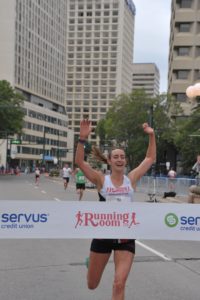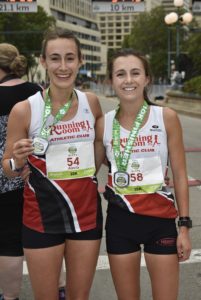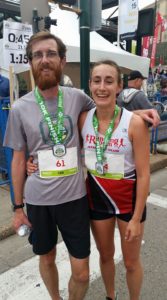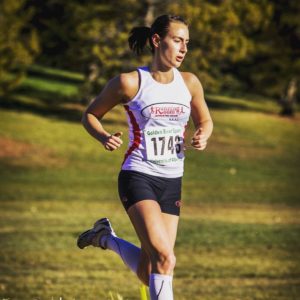
I would like to introduce to you, Alecia Kallos. She recently won the 10km race during the Edmonton Marathon race weekend two weeks ago in a personal best time of 36:01, beating her previous best time by 30 seconds! She is my fellow teammate with the Running Room Athletic Club and a patient of mine. She has made public her recent injury. As well, she has given me permission to speak about her injuries. Originally from Vancouver, Alecia now calls Edmonton home. I asked if I could interview her for two reasons: to celebrate her big win and to learn more about what it takes to be a successful competitive runner. I am impressed by Alecia’s focus, her disciplined life and her resolve when setbacks occur. All wonderful qualities which all of us must develop and learn if we are to be successful, not just as an athlete but in life itself. Enjoy!
- First of all, congratulations on your 10km win this past weekend at the Edmonton Marathon, Alecia. Was this your first big win as a runner?
Thank you! Yes, this was my first time winning a 10km race and my first win at a larger race.
- How long have you been a runner? Did you compete in high school/university?
I’ve been running track and field since elementary school and cross country since grade 11. In high school I played a lot of sports, but I was mostly a soccer player. My plan was to play soccer in university, but I struggled with shin splints. So, my high school cross country coach encouraged me to contact the cross country coaches at my university, and to have them help me cross train while I was injured. I sat out my entire first year of running, but came back fit in my second year and was on the university cross country and track teams during my undergraduate degree. I was consistently the third runner for our cross country teams at provincials and nationals and missed nationals for the 1000m twice by one one-hundredth of a second.
- I understand you work full time as well. How do you balance life with training with work? Can you describe what a typical work-training day looks like as well as a typical weekend?
It’s tricky to balance life with training and work. I sit at a desk all day and so I try to get up frequently during the day and drink lots of water. A typical weekday workout day looks something like this:
6:15am: wake up, get ready for work, and head out the door
7:15am: start work, eat breakfast slowly at my desk
5pm: leave for practice to workout with my teammates. I usually play a pump up playlist on the car ride to practice and spend some time getting focused on the workout ahead.
7:30pm: return home from practice and cook dinner. If the workout was particularly grueling or I’m feeling tight, I’ll foam roll and do some core exercises when I get home.
10:30pm: ideally, I’m in bed by 10:30pm.
On weekends, I’m up by 7:30am, out the door at 8:35am to be at practice by 9am. Sundays are long run days and the team meets at 9am for a 90+ minute run. I use weekends to prepare for the week ahead. I meal plan and grocery shop but I also use my weekends to relax and catch up with friends, explore Edmonton, or go on adventures.

- You just ran at 7:30am for the 10km last weekend. Can you describe your morning routine before a race that early in the morning? How do you practise for this?
My morning race routine is something I developed in university as most of our cross country meets would start at 9am; however, Saturday workouts and Sunday long runs give me plenty of time to hone my morning pre-workout routine. I try to get up 2-3 hours before a morning race and eat immediately. I usually eat 1.5-2 packages of Quaker Maple Brown Sugar oatmeal. Bagels with peanut butter and banana or homemade muffin with peanut butter are also classic pre-race breakfasts for me. I always have a cup of Earl Grey tea and sometimes a little coffee before races. The week or two leading up to an early morning race, I will get up and do one or two easy runs a week in the morning, just to get my body used to getting up, taking in a little food, and running. It does help that I’m a morning person! The key is to use training sessions to practice your nutrition.
- What are your favorite workouts? Least favourite?
I’m a middle distance runner at heart, so my favourite workouts are shorter intervals, such as 1 kilometer repeats for cross country and road racing, and 200m repeats for track workouts. Long tempo repeats with pick-ups in the middle or hill work at the end are my least favourite workouts.
- A lot of good runners are competitive without having a running coach. Your coach is Matt Norminton and you run with the Running Room Athletic Club. What do you think are the advantages of having a running coach?
Having a coach allows me to rely on someone else’s judgement. It takes a lot of guesswork out of the process. He helps me plan my season and creates my workouts each week. Matt is good at reigning me in when I’m pushing too hard and pushing me when I’m struggling. My teammates are a real encouragement during those difficult days at practice.

Alecia with her running teammate, Taylor Carlin
- Talk me through the strategy you used in winning the Edmonton 10K. What went well, what surprised you?
I had two goals for the Edmonton 10km: 1) winning or making the podium, and 2) setting a personal best, ideally under 36 minutes. I spent a lot of time visualizing what winning might look like, what my pace might feel like, and how different variations of the race might play out. It was really nice having my teammate competing against me during the race. We trained together and I knew she would be tough competition. I actually felt like I had a difficult race, technically. My pacing was all over the place and I didn’t have the courage to go out and maintain my goal pace, I think part of that was coming off 8 months of injury with very little racing earlier in the season. I think my extraordinarily fast 3:20 last kilometer is evidence that I could have pushed harder earlier on.
- What are some mistakes you made in other races when you didn’t do so well?
Similar to this race, at last year’s Vancouver Sun Run, I allowed a group of women pull ahead as I was afraid that their pace was too fast for me. I managed to pass 75% of the women by the end of the race. I think I need to learn to be more aggressive earlier on in my races, take more risks and be less fearful of failing. I also don’t race well when I’m not mentally prepared. My mental prep starts months in advance, during training. When the race gets closer, I spend time visualizing the race. I think about how it will feel and I set clear goals and objectives. If I don’t do this, I’m not focused and my resolve tends to waiver when the race gets tough.
- In terms of effort, can you talk me through your perceived effort of exertion throughout that race? In other words, do you start slow, then hold a hard pace and if so, when do you do so?
I generally try to start out at a moderately uncomfortable pace, usually my target pace I’ve been running in practice. I try and settle into this pace by 3km and hold it until 6km. At 6.5km, I push a little more each kilometer with the goal of working really hard in the last 2 kilometers. I’m not sure if this is the best strategy, but it seems to be one I’m more comfortable with and plays to my strengths as I have a strong finishing kick.
- You’re like Mo Farah! How many times do you race a year and what are those distances?
In the fall, I race cross country 5-6 times, usually 5 to 8km in distance. During the winter, I will race in 2-3 indoor races. Then in the spring and summer, I compete in 4-6 road races, which are 5 and 10km in distance and 1-2 mountain relay races. Fall is definitely the busiest as I race nearly every other weekend for 2.5 months.

Alecia with Spencer Morrison, winner of the men’s 10km race
- Most training regimens return to some form of base training where runners work on mileage rather than speed especially during the off season or after a race to prepare for the next training cycle or race. If you race every other week, how do you navigate this period between races?
When racing frequently, each race can’t be your main focus. I pick one or two races over 3-4 months that are my primary focus. The remainder of the races are important, but less so. I don’t taper for them, but rather focus on training through them and using them to get stronger. These are also good races to test out different race plans. It’s also really important to give yourself dedicated time off. After a big set of races, I always take a week or two off from activity. It’s important to give your body and mind a rest from training. By the end of my rest period, I’m usually chomping at the bit to get back into training.
- In your Facebook page, you mentioned that you injured your hamstring 8 months ago. What was this period like for you as a runner, physically and psychologically? What have you learned from this injury and from previous injuries?
I injured my hamstring this past January when I tripped over my dog on a run. It’s amazing to me that something so innocuous could have such a large impact over the next few months of my life. Past injuries taught me that in order to stay sane and happy, I needed two things: a physical outlet and a psychological outlet. In the past, I’ve turned to biking, the elliptical, and lifting weights as my physical outlet; however, this time, most of those activities were out of the question. I was fortunate to have joined up with a swim group at a community centre which kept me sane. I did modified arms-only swimming workouts with them. At physiotherapy, Albert explained to me the four stages of hamstring healing and rehabilitation. I made it my goal to do my best at each stage of healing. This meant that during the most acute stage, I focused on both resting and exercising the injury appropriately and icing on a regular basis. Whenever I would worry about losing fitness or missing races, I refocused on strictly following the rehabilitation protocol. It was a difficult few months, but I had a great community of people supporting me. Just like when I’m running, I set long and short term goals. For this injury, knowing that there was a 10km race at the end of August kept me going. I’d hoped to return to racing sooner, but a setback kept me from my June and July racing plans. I also set smaller, more flexible goals and made sure to celebrate small successes such as my first pain free dog walk, my first treadmill jog, my first full swim practice using my arms and my legs, being allowed to progress in my exercises at physio etc.
As for what I have learned from this injury, I am now more focused on maintaining a consistent strength routine which has contributed greatly to my running success. I’m also more diligent about listening to my body. Many people have told me that hamstring injuries can recur. To prevent future injuries, I spend more time on my warm ups at practice and I incorporate more activation exercises and dynamic stretching. I also foam roll more consistently than before. Finally, my hamstring injury necessitated that I incorporate cross training in my training schedule. Not running for one or two days to prevent a little niggle from worsening is much better than sitting out a week or two because I had ignored that little niggle.

- For people who work too much like me, who have to juggle work and family but are not able to devote as much time to training, but have grandiose dreams of one day winning a race, what advice would you give, other than not having grandiose dreams of one day winning a race?
Don’t give up on your dreams! It’s ok to dream big, but then also set smaller, more realistic goals. I go into every period of training with a ‘stretch goal’, something that’s not very realistic, but is fun to dream about during long runs or hard tempos, and then a series of smaller, more achievable goals. These goals don’t always need to be time goals or winning races, but can focus on other things such as: staying positive during the race, regulating your breathing, pushing hard up hills, etc.
As for juggling running and life, a saying that keeps me going is “constancy of purpose over time” (emphasis, mine). Focus on your long term goals and then do those small, important things every day to try and work towards that goal. These small things may include doing a set of squats or your rehab exercises, getting a little extra rest the night before a big training session, foam rolling, or eating healthy. Every small thing contributes towards your big goals and you will see success over time.

